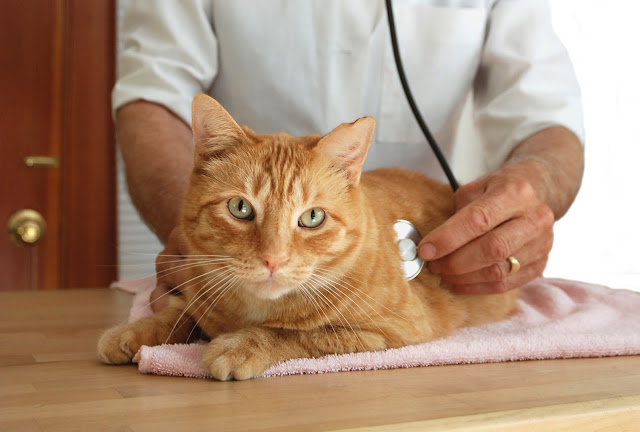One of the most common diagnostic tests used in veterinary medicine, the CBC examines your cat’s white blood cells, red blood cells, and platelets to test for anemia, infection, inflammation and overall healthiness of the blood cells. It also evaluates the number and type of cells in circulation. An important part of senior wellness exams, this may also be the first test your vet orders if a cat is not displaying any overt signs of illness, disease or injury, but are acting generally abnormal.
Chemistry Tests
The chemistry panel surveys many of the organ systems of the body to make sure they are working normally. Most veterinary chemistry panels check blood electrolytes and for diseases of the liver, kidneys, and pancreas. Chemical compounds used to evaluate liver function include alkaline phosphatase (ALP), alanine aminotransferase (ALT), aspartate aminotransferase (AST), and bilirubin. These tests can detect decreased liver function, inflammation, infection and the abnormal growth of cells in the liver and gall bladder. Blood urea nitrogen (BUN) and creatinine monitor the function and health of the kidneys, not only kidney disease but also urethral or ureteral obstructions or dehydration. Tests that evaluate the pancreas, such as glucose and triglycerides, can detect diabetes and pancreatitis. Tests of the muscle and bone can also be performed to determine the health of bone metabolism, to check for muscle damage, trauma or inflammation, and to monitor the electrical, water balance and cellular health of the body.
Many veterinarians can perform some small chemistry panels 'in house,' which means within the veterinary facility. For larger panels, the tests are often performed by a local laboratory, frequently within a human hospital. A chemistry panel can be used not only as your pet ages but in their earlier years in order to provide a baseline of what's normal for your cat.
Thyroid Function Tests
The measuring of thyroid hormones (usually T4) is performed when thyroid disease is suspected. Hyperthyroidism is a common disease, especially in middle aged and senior cats. It results in elevated thyroid hormone levels circulating in the blood stream.
The IDEXX SDMA Test
Kidney disease is a leading cause of death for cats. Over 1 in 3 cats are likely to develop kidney disease in their lifetime, and as they age the likelihood of developing it increases. In fact, more than half of cats over 15 are afflicted. Since cats hide illness so well they typically show no symptoms (such as drinking and urinating more than normal) until their kidneys have lost most of their function - permanently.
Now IDEXX SDMA, a breakthrough test that screens for chronic kidney disease, can detect this serious disease months to years earlier, when there is still time to do something about it. This is great news for cats, as IDEXX SDMA can detect kidney disease when much of a pet's kidney function is still intact, giving you and your veterinarian the chance to take action and give your pet the best shot for a healthy, happy, long life - even with kidney disease.
The IDEXX SDMA test is available to all veterinarians in the U.S. and Canada. Even better, many veterinarians in the U.S. are already including IDEXX SDMA in their routine testing, almost always at no added cost. If your veterinary hospital is not doing so, just ask your veterinarian to send your pet’s samples to IDEXX’s Reference Laboratories.
Urinalysis
A urinalysis assesses the health and function of the urinary system, an important test in the early detection of kidney disease, diabetes, or infections of the bladder or kidneys. While a chemistry panel can help evaluate kidney function, much more information can be obtained when a urinalysis is done at the same time. The urine sample is tested for several chemical components (glucose, protein, blood and more), as well as cells (white blood cells, red blood cells, epithelial) and crystals.
The American Animal Hospital Association (AAHA) recommends that cats have a comprehensive set of lab tests performed once a year upon reaching middle age even if your pet appears to be healthy, including blood work and a urinalysis. For senior cats, AAHA recommends that this minimum database of lab work be performed every six months. Keeping on top of your cat’s changing health as they age is one of the easiest ways to help our furry friends lead longer, healthier lives.


9 comments:
Mudpie, thank you for the reminder and also for the very thorough information. We like to keep our kitty cats and tip top shape. That's because we love them.
Mudpie, Mom said she is copying this info to put in my file. I go for my senior testing yes, but I doubt I have that extra kidney disease test. Mom said she will check my lab results.
Great points, Mudpie. Spot on too.
Have a purrfect day. My best to your mom. ♥
Yep, those are all really important and I get them all every 6 months.
Excellent post. I agree these are all necessary. XO
Thank you for passing along all of the potential problems to look out for. Very well communicated. I'm going to copy this and keep and refer to it in future.
Great points, Mudpie! When we've had senior kitties, they regularly got a battery if extra tests and more frequent checkups.
It's important to get blood work done at least once a year for seniors, even if they appear healthy.
We were getting a baseline blood work done for Tylan last year, and we found that he has hyperthyroidism and kidney disease, and he wasn't showing any symptoms. The blood work helped us treat his conditions quickly and stabilize him.
I agree! Very important tests to have!!
Purrs, Julie
Post a Comment